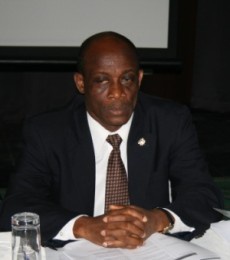Finance Minister Seth Terkper says though government intends to tap the international bond market more often to meet the country’s infrastructure-financing needs, it will hold back from venturing into the market again until the fiscal environment is more stable.
Mr. Terkper who last month led a team of Treasury and central bank officials, together with transaction partners and advisors, to launch Ghana’s second Eurobond, said the success of the US$1billion issue on July 25 has increased government’s appetite for long-term internationally-sold bonds, which are cheaper compared to domestic-issued debt.
The US$750 million cash component of the Eurobond -- the remainder of US$250million was used to partly redeem a previous issue set to mature in 2017 -- sold at a coupon rate of 7.875 percent and a yield of 8 percent. This compares to domestic debt that is currently been serviced at an average interest rate of between 19-23 percent, twice the economy’s rate of inflation of 11.8 percent.
“If we stabilise the fiscal situation, we can do more bonds to finance capital projects,” said the Finance Minister in an interview with the B&FT. “But I’m not going to the market again if the fiscal is not right.”
Ghana, which spends US$1.2billion annually on infrastructure, still faces a spending gap of US$1.1billion, the World Bank has said. About US$409million of the recent Eurobond, equivalent to 41 percent of the total amount sold, has been earmarked for capital projects. These include investments set out in the 2013 budget and projects which are being financed jointly from government’s own resources and a US$3billion credit line from the China Development Bank (CDB).
As the bond is also aimed at reducing the cost of government debt, US$341million, or 34 percent of the proceeds, will be used to refinance maturing local debt; much of which will come from the short-end -- 91-day bills to 2-year notes -- of the market.
Mr. Terkper said he has “no doubt” government will resolve the fiscal problems it is presently confronted with. “The only things left now, as far as the fiscal balance is concerned, are utilities prices and wages,” he said.
Wages for government employees are the largest sector of state spending, equivalent to about 70 percent of tax revenue.
Mr. Terkper has insisted that this path is “unsustainable” for the country, and has been urging labour unions to make pay demands that can be accommodated within the spending resources of the state.
Ghana’s large budget deficit, relatively weak sovereign rating and the timing of its bond-- after the US Federal Reserve Bank signalled a possible rise in market interest rates -- may have led to a coupon rate that was well above issues by sub-Saharan African peers Nigeria, Rwanda and Zambia in the past 12 months, according to analysts.
The 8 percent yield on Ghana’s bond compares to 6.625 percent on Nigeria’s 10-year US$500million bond sold on July 3.
Fitch Ratings rated the issue B+, affirming its B+ sovereign rating for Ghana -- the outlook on which it lowered from stable to negative in February after the official disclosure of the gaping fiscal hole of 12 percent of GDP in 2012 (now revised to 11.8 percent of GDP). Despite a revenue crunch, government is still targetting a reduction of the deficit to 9 percent of GDP.
Business News of Tuesday, 20 August 2013
Source: B&FT
Eurobond whets appetite for int’l capital

Entertainment











